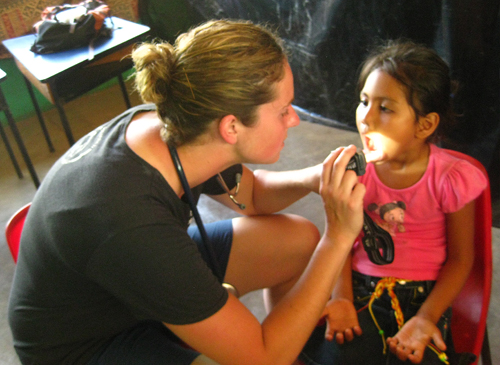
A vacation with friends to the Dominican Republic while in university is what sparked U of G grad Kelly Ogilvie’s drive to provide healthcare to those in developing countries.
She was in her third year in biomedical science at Guelph when she decided to take a break from studying and spend a week at a resort on the Caribbean island.
“I left the resort and went on a day trip to the city,” says Ogilvie, who entered U of G in 1999 as a President’s Scholar. “I had never seen poverty like that before, and it made me start to think about the poverty that must exist in developing countries throughout the rest of the world. That experience had a profound impact on me.”
After graduating from Guelph in 2003, she attended medical school at the University of Toronto and began seeking ways to use her medical expertise to help those who lack access to healthcare in developing countries.
During her residency she travelled to India and spent six weeks working in remote villages in the Himalayas with the Himalayan Health Exchange program.
After that she went to South Africa for six weeks and worked in a hospital helping trauma patients while completing her residency in emergency medicine at the University of Ottawa.
Ogilvie also travelled to Honduras three times with the Friends of Honduran Children medical brigade.
Although she recently landed a job as an emergency room physician at St. Paul’s Hospital in Vancouver this past fall, she has plans to squeeze in two more trips to Honduras with the medical brigade in February and August.
“I really love the work I get to do there,” she says.
Ogilvie is one of 20 medical professionals who make up the brigade. On each trip, they bring with them 30 hockey bags full of medical equipment and medications. They travel several hours by truck to remote villages and set up primary care clinics in schools or abandoned buildings.
Ogilvie’s team sees about 250 patients a day. The children are often malnourished and suffer from rashes, severe bacterial infections and rotting teeth. The adults often have cataracts, congestive heart failure and rheumatoid arthritis.
“When we see them they are usually in the advanced stages,” says Ogilvie. “Health conditions that people here wouldn’t put up with, they seem to tolerate.”
Although she is working with limited supplies, Ogilvie has found simple medical care can be effective.
“I remember one man who came to me, and he had a large growth on the side of his nose that was blocking his vision in the one eye,” she says. “I was able to cut it off so he could see. He was so happy and so thankful.”
Despite the hundreds of people she has treated throughout her volunteer work in Honduras as a medical professional, Ogilvie admits she is unsure if she has had an impact on the population’s physical health. However, she does believe she has impacted their emotional health.
“From a healthcare perspective, I don’t know if I am making a difference. But I think the fact that a group of Canadians travel a day by plane and then drive another day by truck to these remote villages to see what we can do to help shows that these people are not forgotten.”
In addition to her future trips to Honduras, Ogilvie also hopes to travel to Nepal within the next year to help with training medical students in emergency care as part of a partnership between St. Paul’s Hospital and Kathmandu University.
Ogilvie started working at St. Paul’s Hospital in October. She has always wanted a career as an emergency room physician and even volunteered at her local hospital’s emergency department in Bowmanville, Ont., throughout high school.
“I love the intensity and that you never know what to expect next,” she says. “I also like the challenge of having to build a rapport with a patient in a matter of minutes. You get to learn about people’s lives and what they are going through. It’s health issues and social issues all wrapped up into one.”
Ogilvie feels grateful to be working in her dream job. Volunteering her time and expertise to those less fortunate is a way for her to give back.
“When I come home after spending time in these remote villages, I always have this overwhelming sense of appreciation for all the amenities that I have. I know it’s just luck that I was born in Canada and not somewhere else. I am so privileged. How can I not help out?”